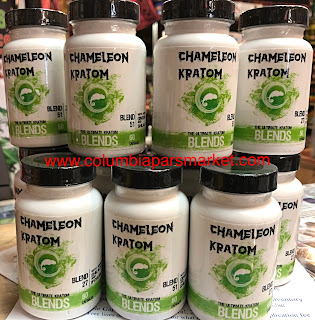Info on Kratom:
Also know as Ketum, Kakuam, Ithang and Thom; Mitragyna speciosa (Kratom) is a leafy tree that grows from 3-15 meters tall. It's leaves contain mitragynine and was traditionally chewed as an opiate substitute and stimulant in Thailand and South-East Asia. The alkaloid content of the leaves of Mitragyna speciosa is about 0.5%, about half of which is mitragynine. An average leaf weighs about 1.7 grams fresh or 0.43 grams dried. Twenty leaves contain approximately 17mg of mitragynine. Always make sure you do buy Thai Kratom from a reputable supplier for the best quality. Kratom's pharmacology is primarily mediated by the alkaloids 7-hydroxymitragynine and mitragynine. While these molecules share structural similarities to the psychedelics, there is no psychedelic activity or similarities in effects to such substances. Instead these alkaloids primarily interact with the adrenergic and opioid receptors. Accordingly, kratom is known to prevent or delay withdrawal symptoms in an opiate dependent individual, and it is often used to mitigate cravings thereafter. It can also be used for other medicinal purposes.
Kratom has been traditionally chewed or brewed into a tea, for its effects, in regions such as Malaysia, Thailand, and Indonesia, but was officially introduced to the Western world by ethnobotanists during the 19th century. Besides Kratom, in Southeast Asia and the Pacific Islands it also goes by the names krathom, ithang, biak biak, ketum, kakuam, and in southern regions, thom. In these areas kratom has a history of use by laborers and in folk medicine for opium dependence and diarrhea.
Of the two main active constituents, mitragynine has been studied more thoroughly than 7-hydroxymitragynine. At lower doses, mitragynine exhibits a yohimbine-like binding to alpha-adrenergic receptors, as well as some binding to the delta opioid receptors. As doses increase, binding to delta receptors increases, and in yet higher doses, crossover to mu Opioid receptors occurs.
7-Hydroxymitragynine was only recently understood to be the main active ingredient. Limited animal research suggests it is a potent opiate agonist, but with a ceiling effect that limits the potential for respiratory depression and euphoria. No fatal overdose of kratom is known to have occurred.
One study of Thai users reported that kratom has subtle calming effects in low doses, changing over to mild stimulation in higher doses. Other anecdotal sources say that it may be a mild, caffeine-like stimulant in lower doses, but decreases the effect in higher doses, which is consistent with mitragynine's receptor binding profile. However, recent publications indicate that different alkaloids may be at work to achieve mild stimulation versus sedation: whereas higher concentrations of mitragynine are attributed to act as a sedative, 7-hydroxymitragynine appears to be a significant alkaloid for reducing stress associated with opioid craving. Effects come on within five to ten minutes after use, and last for several hours, depending on individual physiology. The feeling has been described as subtly active, while the mind is described as calm.

Comments
Post a Comment
your comments here!